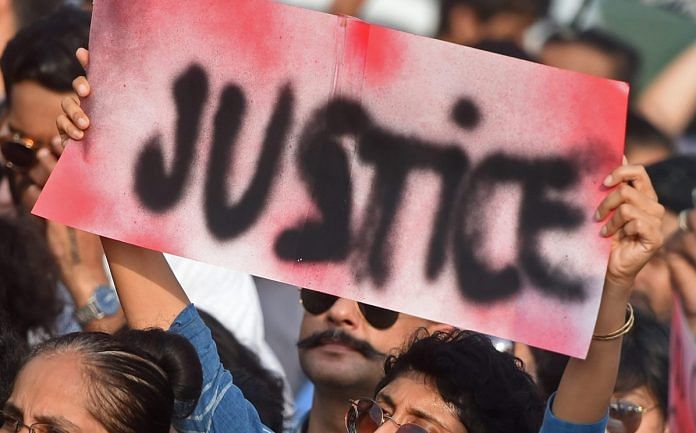My name is Lokesh Pawar and I am a sexual abuse survivor, and no, I am not a female.
It is a common story that lingers in every corner of India and beyond, but is often missed. Numerous male sexual abuse survivors are left only to survive – living without justice for something that they never started. We don’t even know the magnitude of it. Fortunately, the country is starting to talk about this problem now.
In 2018, the National Crime Records Bureau (NCRB) said 109 children were sexually abused every day in India. The statistic on crimes against women is even harder to gulp. But one aspect of this problem is always missing from such records and statements – male sexual abuse.
I was first sexually abused at the age of six, which continued until the age of 15, by a member of my extended family. It is unfortunate, but most people still don’t want to talk about it. This very lack of conversation has created several problems for me and many others.
Also read: There’s only one way to tackle India’s sexual violence epidemic – sex education
An epidemic
In a cross-sectional study of gender-based violence against men in Haryana, 52.4 per cent of men said they had experienced violence. Most probably, this is a low estimate since it doesn’t include non-contact experiences, which can also have lasting negative effects, and these are just the ‘reported’ cases.
The social stigma and silence around male sexual abuse and assault result in a lack of awareness about the effects of these experiences. It also prevents boys and men from reporting cases against the abusers, resulting in no closure or healing for all those affected.
It took me nearly four years of personal research to understand the gravity of the incidents that had unfolded over nine years of my life. People do not realise this, but the word ‘NO’ has immense power in it and must be used more often. I remember the day I stood up to my abuser when he told me, “Karde meri khushi ke liye (Do it for my happiness)”. I had heard it way too many times, and could no longer stand it, and said, “NO!” At that point, I saw a rapist in him, not a relative.
In a country like India, men are constantly told to hide away their emotions behind the statement ‘Mard ko dard nahi hota’, and it leaves them torn with the fear of societal repercussion. The same view has led people to believe that a man or boy cannot be raped or sexually assaulted because of their privilege and standing in a patriarchal society. Sexual abuse is no less than an epidemic, and it needs the attention of lawmakers and people in this country.
For me, the entire experience itself was painful, hurtful and traumatising, but the moment you understand that you are not at fault and that there is no need for you to be ashamed, healing begins.
Also read: How to save your teenage child from sextortion on Instagram
Listen
As I dive deeper into something that largely lacks representation, I hope that this world stops gendering abuses, violence and cases of rape. I also hope that the legislative bodies bring about necessary amendments to the POCSO Act, keeping pace with ever-evolving societal needs.
But just how the decriminalisation of Section 377 has in no way changed the mindset of most people towards the LGBTQIA+ community, only laws and acceptance of male sexual abuse will not help survivors. Moreover, the several guidelines given out by the Ministry of Women and Child Development are yet not implemented in the country. Not even one court in India is child-friendly – survivors know that.
No wonder so many cases go unreported today.
For men, it is more difficult to open up or report cases of abuse because society largely doesn’t believe a man can be raped, and I have been a victim of this. As important as it is to make laws, a more open mindset is equally essential.
That’s where the power of social media comes in.
The world has truly become small and social media has played a key role in making that happen. Ever since I shared my story of abuse publicly, I’ve received truckloads of love and support from people all over the internet. Having said that, it is truly sad that countless people, regardless of their gender, could relate to the trauma and experience. As an activist, I get to talk to a lot of survivors and every time I talk to someone, we form a mutual understanding. We let each other know that we aren’t alone in it. And that is an empowering feeling.
Social media has also opened up the opportunity for me to be a part of several support groups like HUMEN – a UK-based support group for men to share their pain and trauma, and most importantly, listen.
My story and my experience have been heard already. What I am doing now is being that supportive ‘someone’ who I couldn’t find for myself back then.
The author is a 23-year-old writer, content creator and a sexual abuse survivor and activist. You can find him on Instagram @lokeshpawarr and on Twitter @Lokeshpawarrr. Views are personal.
(Edited by Neera Majumdar)




Very well written. And so strong. I admire your courage.
Good that this serious issue plaguing our society is now being talked about. I heard many stories where even a group of friends abused a male on formal or informal trips but the poor victim had nowhere to raise his voice or get comforted!